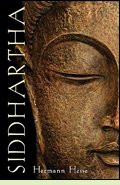|
Siddharthaby Hermann HesseReviewed by Margaret Donsbach
Novelist Hermann Hesse splits Buddha and Siddhartha into separate figures, telling Siddhartha's tale in a way that includes Buddhism as one of the spiritual paths he considers but leaves to one side. Siddhartha tells the Buddha, "You have learned nothing through teachings, and so I think, O Illustrious One, that nobody finds salvation through teachings." Siddhartha seeks not merely to live in accordance with spiritual principles; he seeks enlightenment itself. The journey proves long. The novel echoes traditional tales of the Buddha without incorporating every detail. Siddhartha lives as an ascetic, as a worldly man who indulges in sensual pleasure and pursues wealth, as a simple boatman, and as a father. It is the suffering inherent in his love for his child which gives him the final push toward enlightenment, as he "began to realize that no happiness and peace had come to him with his son, only sorrow and trouble. But he loved him and preferred the sorrow and trouble of his love rather than happiness and pleasure without the boy." Siddhartha's enlightenment arrives as a deeply mystical vision, impossible to explain or understand rationally, but with the power to move readers. Hesse's engaging and lyrical tale, beautifully simple but never simplistic, offers spiritual insights drawn from Buddhism with a freshness and independence that has made Siddhartha a literary classic in the West. (1922 in the original German; most English editions range from 110 to 160 pages) More about Siddhartha at Powell's Books or Amazon.com
Wake Up: A Life of the Buddha by Jack Kerouac (1955), a retelling of the story of Siddhartha's journey to become the Buddha. More info Julian's Cell by Ralph Milton (2002), about the medieval English anchorite and mystic Julian of Norwich. More info Sun Dancing by Geoffrey Moorhouse (1997), alternating fiction and nonfiction about life at the medieval Irish monastery on the island of Skellig Michael. More info
The Way of Zen by Alan Watts (1957), a historical introduction to the origin and development of Buddhism and its various schools with particular emphasis on Zen. More info How to Practice: The Way to a Meaningful Life by the Dalai Lama (2002), an explanation of the beliefs and practice of Tibetan Buddhism by its spiritual leader. More info The Search for the Buddha: The Men Who Discovered India's Lost Religion by Charles Allen (2003), about eighteenth- and nineteenth-century explorers from Europe who rediscovered historically important Buddhist sites in India and introduced Buddhism to Europe where it was then largely unknown. More info
The Buddha, a documentary about the life of the Buddha, at the PBS website
Back to Historical Novels of India
|
